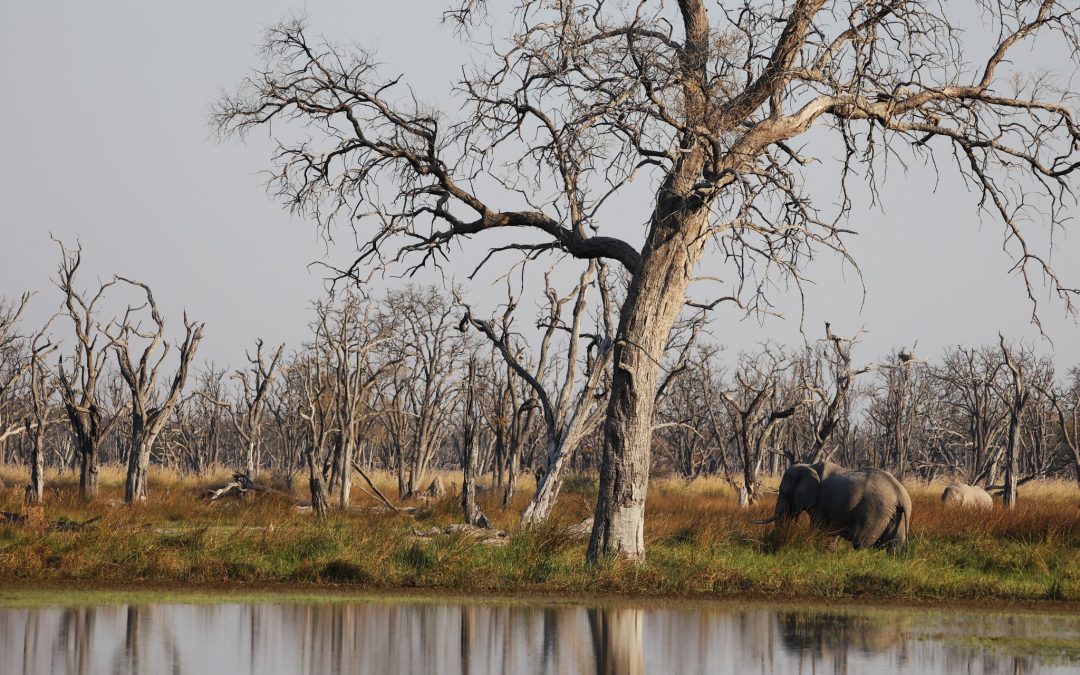The moonlit silhouette of a male leopard was standing a mere five meters from our tent. This tomcat was on his routine patrol and thankfully gave us a heads up by calling intermittently enroute. It was difficult to contain our excitement of being so close to this special creature as he walked by in the early hours of the morning. Our Magotho campsite was beautifully wild, set in Botswana’s Khwai Community Area. Shaded by that tall and stately old king of the combretums, the leadwood tree, it overlooked the lush Khwai river. In fact, it is a so-called overflow extra campsite we had to use after our booked spot was double-booked – something which presumably happens quite often judging by the number of them and the various disgruntled overlanders we met. But sometimes things happen for a reason. Our leopard certainly did not mind it not being an official camp, and neither did the wading elephant bulls the next day or the grazing hippos the night after that.



Khwai is community-owned land wedged between Chobe and Moremi. Entering the area for the first time is strange. No park gates with elephant skulls, flag posts and gate times. No park fees or overpriced wood bundles. Not even one of those dusty sign-in registers. Yet, and maybe in part due to this, you experience a sense of true wilderness. Driving towards the Khwai Development Trust’s Magotho camp on one of its deep sandy roads, we found a large open glade – a veritable forest of dead trees – again mostly our friend the leadwood, showing how it can continue to stand firm for up to 80 years after it had died. A lonely elephant bull welcomed us and showed us our campsite like the caretaker, walking slowly through the dead trees with the African sun setting behind it.
Over the next few days we started to understand why some people come here for a month at a time. Dawn was announced by a pair of fish eagles and multiple groups of roaring lions, the tracks of which we found around camp most days. An early start saw us having coffee and rusks next to a beautiful stretch of river, watching the sun rise in the East and trying to get that shot of a hovering pied kingfisher. We explored the intricate network of bush tracks, many of which unceremoniously cross through the river. Unlike the 1957 film’s title suggests, there definitely is no bridge over this River Khwai – at least not near Magotho.



We saw wattled cranes and a rufous-bellied heron for the first time, something which I suspect excited us way more than the jeep jockey and his group of pale-faced tourists, judging by their ‘but it’s not a lion?’ expressions. We had the rare experience of getting up and very close to two cheetahs with their fresh impala breakfast. Hearing sinews torn and flesh chewed while almost touching these magnificent creatures is deeply impressive. We were even (un)lucky enough to (accidently) choose the exact same spot as two lions to get out for a quick bathroom break. One is humbled when, shortly after said ablution has been completed, fellow tourists arrive from the front and fix their cameras on the lions that subsequently proceed to emerge from their nap behind the mopanis, uncomfortably close to where one has just made a puddle.




On our last day, while catching up on some admin, we shared our remote office space with a leopard. This beautiful feline took a cat nap high up in a – you guessed it – leadwood tree. She allowed us to sit under her tree for almost four hours. Witnessing her periodic shifts, her gaze at a herd of elephants passing underneath and her irritation at the alarming squirrel nearby felt like we were invited into this cat’s leadwood lounge.
We shared many wonderful experiences during our time in these fascinating leadwood-filled places, and above all we were privileged to catch a glimpse of a connection with the creatures and particularly the predators here through close and very personal sightings. There is an ancient and definite connection between all living things. The Ovambo people has a deep-rooted respect for leadwoods and believe that these protected trees are the common ancestors of both humans and animals. If Moremi and Khwai are anything to go by, we suspect that this might just be true, and that perhaps humans can pay more attention to their end of the link.





